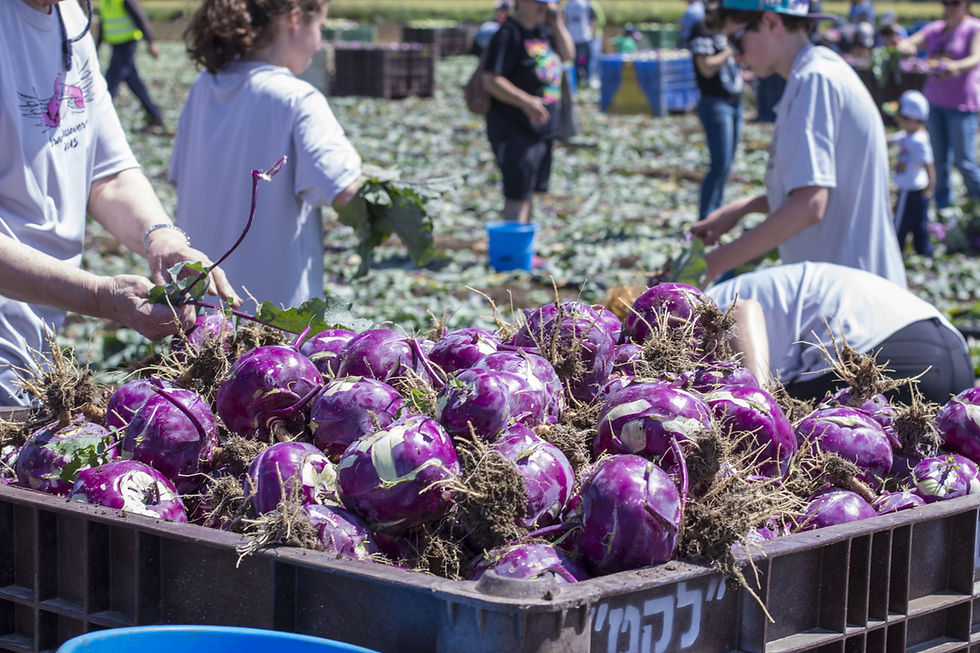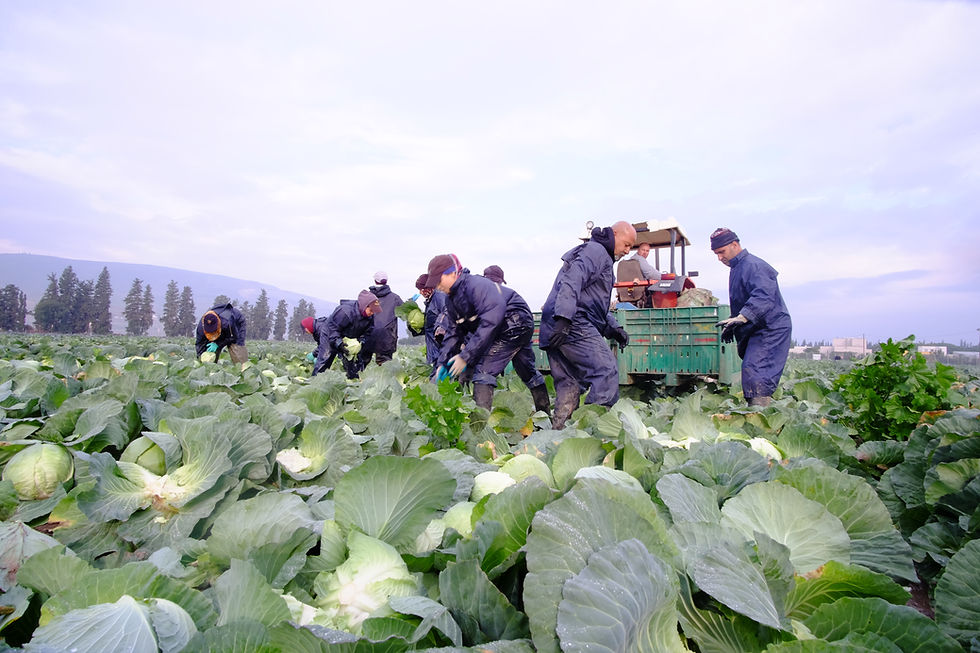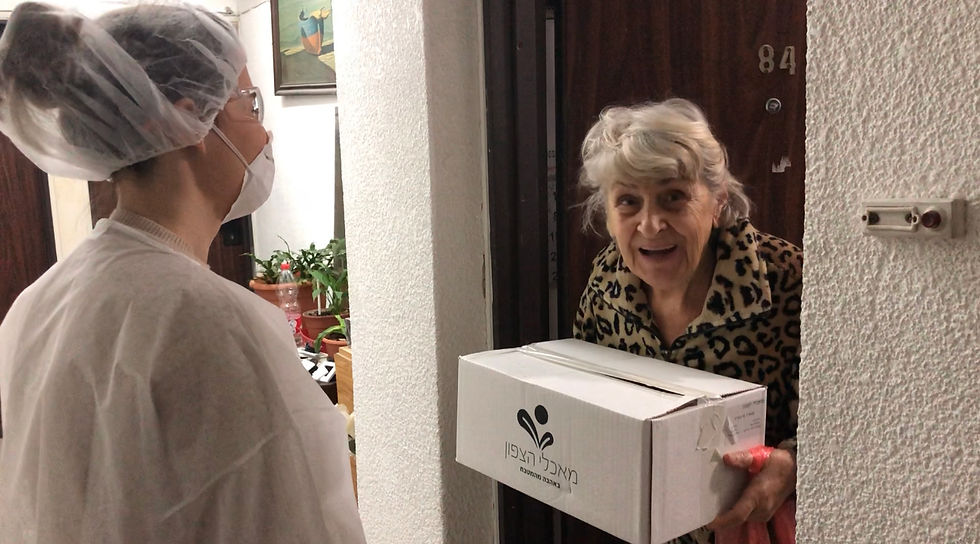Why Farmers are the Secret Ingredient to Ending Food Deserts
- iKonnect
- Apr 29, 2021
- 4 min read
Updated: May 31, 2021
With Leket Israel
A farmer’s life is not simple.
They need to grow foods that are in demand, they need to grow just the right amount, they need to make sure it survives the particular weather conditions of the year, and they need to have enough workers to pick the produce before it goes bad.
Although they have a lot of challenges, an abundance of produce is not one of them. Farmers overplant to account for any number of things that can go awry in the growing process. For example, if they get an order from a hotel chain for 10 fields of produce they grow 12 or 14 fields, in case something goes wrong with one of the fields. They also overplant to take any “ugly produce” into account. Supermarkets won’t buy any fruits or vegetables that don’t look good, so if a farmer has a batch of lumpy potatoes - they won’t be able to sell it.

While farmers are harvesting surplus in the fields, in the city food deserts are growing every year. Food deserts are areas where people can’t afford to buy fruits and vegetables on a regular basis, or even at all. No farmers want to destroy their produce, especially since it emits greenhouse gases, but many don't have a choice - they simply don't have the manpower to get their extra produce to the people that are desperate for it.
They too need help.
This is where Leket Israel, the leading food rescue organization in Israel steps in.
In 2003 Joseph Gitler started rescuing meals from catering halls and corporate cafeterias out of his Subaru car. The meals were stored in refrigerators lining his driveway before delivery to local nonprofit organizations serving the needy. Today they serve 246,000+ needy people weekly and rescue hundreds of acres of produce that would otherwise get destroyed or thrown out and millions of excess hot meals from corporations, hotels, and the Israeli army.
Farmers are still their main source of food donations because of the sheer mass of produce they harvest. This year in particular, with so many flip-flopping Covid regulations, farmers kept growing things because they had no idea when things would open up. Leket Israel rescued 20% more than expected in 2020. Their goal was 15,000 tons and they rescued 18,500 tons. This year they have already surpassed their monthly targets in the goal of rescuing 21,000 tons of food.

Leket not only sends trucks to pick up excess produce, but they also send their own pickers to relieve the farmer's burden. Sometimes a farmer has five fields of produce, but only enough workers to pick four of them. By the time he would reach the fifth field the produce would be bad so he donates it and Leket sends their volunteers to harvest that field.
The food rescue organization is trying to specifically combat the issue of food deserts - not just provide any food.
"We specifically put an emphasis on nutrition. We are working with people who don't know where their next meal is coming from," Joseph Gitler, Founder and Chairman of Leket Israel, told us. "When people are living with that mindset, they tend to make unhealthy choices." "When people are at that level of hunger, they tend to eat cheap carbs because it feels like it will provide them with more fullness longer," Gitler explained.
Leket distributes food in a way that provides people with one-third of their daily required nutrients.
One of the unique challenges of providing food to so many different communities in Israel is that every community has different needs - but that wasn't always so apparent.
But they have learned since then.

They now customize their orders to all the communities they are serving, from soup kitchens to old age homes, and even organizations for youth at risk. However, the challenges have only increased because of the impact of Covid on the country. Last year they provided food to 200 non-profits and 175k people weekly, this year they are serving 330 non-profits and 246k people weekly.
"In addition to the people you had the day before Covid, you now have people who are unemployed and on chalat (unpaid leave). Now it’s people who had a job at high tech and now don't have a job in high tech"
Eilat in particular was decimated since their economy is almost exclusively reliant on tourism. They used to have 300 people in line for food before Covid and now there are 1300 people lining up for food. One resident of Eilat is divorced and remarried. He is supporting his ex-wife and their two children and his new wife and their baby. He was working on a cruise ship before Covid hit and was able to support both families. Now he is out of work and has to turn to charity for food.
There's nothing for anyone to be ashamed about. As Gitler affirms, "It's not something people can prepare for. It's not something people did wrong. It's just a crazy circumstance."
They are trying to keep up with the ever-increasing demand, but the organization themselves have taken a hit. Although they had a massive surplus of produce this year, the cooked meals that they usually get from event halls catering halted abruptly.

The army was the only place that they still had cooked food coming in from. The Israeli army has to cook for everyone that is in, or works for the army, even if they aren't on-base plus 10% extra. They usually get one million meals from the army, but due to Covid, the army made tv style dinners so even they didn't have the same surplus as usual.
"For the first time ever we started purchasing meals. Our mission is food rescue, but bottom line is to feed people," Gitler said. They partnered with catering companies and brought them back from furlough. They commissioned catering companies to do boxed dinners that people could keep in their fridge and just heat up. Starting in March they purchased 12,000 meals per day and started doing home deliveries. We are especially concerned about elderly people and prioritized them for the hot meal deliveries.
The need for food rescue is not slowing down and neither is Leket Israel.
Leket Israel is making sure that the farmers get the help they need to help others in need.
Because of those lumpy potatoes that the farmers almost threw out - they are needed more than ever.
